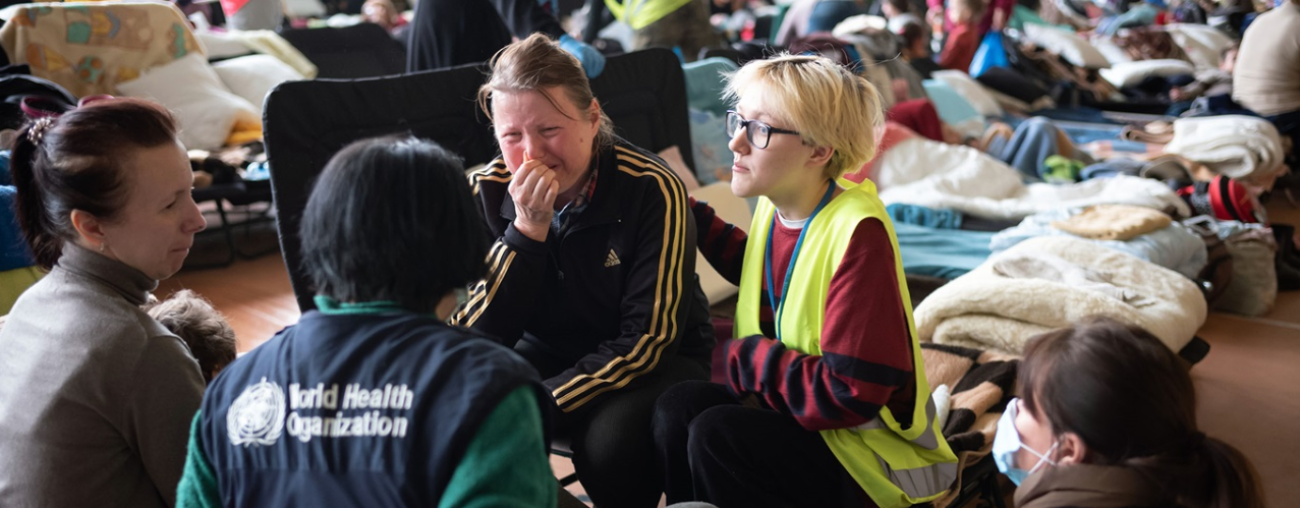WHO supports an inclusive response to refugees with disabilities in Georgia

WHO is collaborating on a project to improve access to services for refugees with disabilities in Georgia by supporting service providers in the country.
The ongoing war in Ukraine has disproportionately affected persons with disabilities and the new joint programme aims to address the challenges and needs of Ukrainian refugees with disabilities in Georgia. The project is being undertaken with the European Disability Forum, 4 United Nations agencies, Georgian organizations of persons with disabilities, and key government ministries.
Since the Russian Federation invaded Ukraine on 24 February 2022, over 197 000 Ukrainians have entered Georgia, as calculated by the United Nations High Commissioner for Refugees (UNHCR). Georgia serves both as a transit and destination point, mainly due to its simplified entry and migration policies and lower cost of living compared to most European Union (EU) countries. The project, Mainstreaming a disability-inclusive humanitarian response to the Ukrainian refugee crisis, aims to review coordination systems between central and regional institutions, UN organizations and other humanitarian actors, and gather reliable data on Ukrainians living with disabilities in the country.
“Maybe some people need wheelchairs, maybe someone has a family member who is deaf and requires a hearing aid, but we don’t know about them, and they don’t know that help is available,” said Giorgi Dzneladze, Chairman of the Coalition for Independent Living in Georgia. “I hope this project can bridge that gap and connect people with the help they need.”
Bridging the gap between people and services
As of January 2023, UNHCR estimates that approximately 25 000 Ukrainian refugees remain in Georgia, with 62% being female. Male refugees account for 38%, and this number is significant because, under the current Ukrainian Martial Law, only older men, men with disabilities, and men who have a dependent with a disability can leave Ukraine. People over 60 years-old and minors account for 8% and 26%, respectively. Many of these arrivals are expected to stay at least until June, which is the end of the school year in Georgia, but it’s likely that they will also stay beyond then. Having fled from many parts of Ukraine, but predominantly from eastern areas, many families no longer have a home to return to.
The challenges of fleeing to a foreign country can be overwhelming for anyone, especially persons with disabilities. Moreover, people with complex health needs must navigate unfamiliar health systems to access essential services and assistive products while dealing with language barriers, financial hardships and psychological trauma, among others.
The Government of Georgia has ensured that Ukrainians who fled the war are granted access to health care. To help refugee children alleviate stress and trauma, psychosocial centres are working in Batumi at full capacity. However, it’s been reported that some essential services, such as primary health care, frequently remain inaccessible. Bureaucratic processes and the lack of information on how to access services have resulted in many refugees being unable to receive the help they need.
Partners gather in Tbilisi to launch the programme
The kick-off workshop took place in Georgia's capital, Tbilisi, on 2–3 February. It gathered project partners from WHO/Europe, WHO Country Office in Georgia, UNHCR, Office of the United Nations High Commissioner for Human Rights (OHCHR), United Nations Children’s Fund (UNICEF), United Nations Entity for Gender Equality and the Empowerment of Women (UN Women), and United Nations Population Fund (UNFPA).
Members of organizations of persons with disabilities, such as the European Disability Forum and Coalition for Independent Living, also took part, sharing their experience and raising questions and concerns regarding the issues of refugees with disabilities in Georgia, such as a shortage of interpreters in shelters or the lack of specialized schools. In turn, representatives from the Georgian Ministry of Internal Affairs, Ministry of Internally Displaced Persons from the Occupied Territories, Ministry of Health and Social Affairs, and local municipalities reported on new government decrees and initiatives designed to help this population group, such as adjustments to the process of disability determination.
“I believe that projects like this can really help people with disabilities, including refugees from Ukraine. I'm happy to use my personal and professional experience to make this kind of difference,” said Mariya Yasenovska, who fled from Kharkiv after the war broke out and now supports the European Disability Forum as its Human Rights Officer.
Background
Funded by the United Nations Partnership on the Rights of Persons with Disabilities (UNPRPD), the programme takes place in Georgia and Moldova. Other goals include improving services dealing with sexual and gender-based violence for refugee women and girls; strengthening the legislative framework; promoting access to employment, education and social protection for persons with disabilities; and eradicating stigma and discrimination. The programme will conclude on 31 October 2023.

